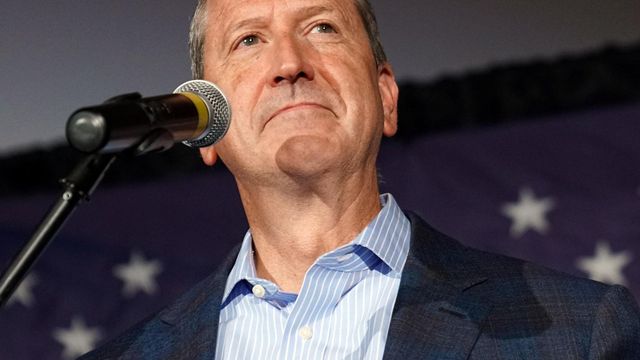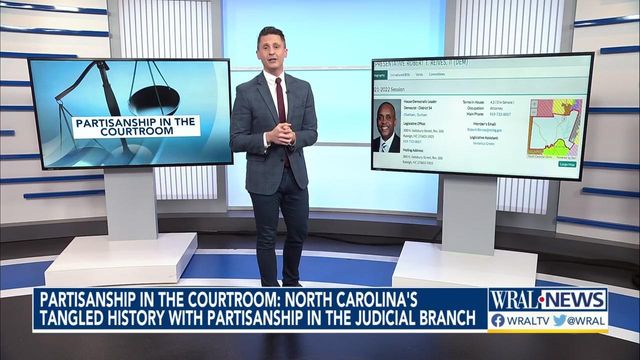NC Congressman sues state Supreme Court
Congressman Dan Bishop, a Republican who represents a district between Charlotte and Fayetteville, wants the judges' vote counts in a trio of decisions this month that resulted in a delay of North Carolina's 2022 primary elections.
Posted — UpdatedA North Carolina congressman filed a lawsuit Wednesday against every judge on the state Supreme Court and Court of Appeals, asking a federal court to force them to give up basic information about recent decisions delaying North Carolina’s 2022 primary elections.
Each decision was announced via court order, but the orders didn't say how the 15 judges on the state Court of Appeals, or the seven justices on the North Carolina Supreme Court – both bodies elected in partisan races – decided the issue.
“There are no grounds whatsoever for our courts to operate in secret,” Bishop said in a Tweet late Wednesday announcing the suit.
Graham Wilson, a spokesman for the courts, declined to comment on the lawsuit. "The Judicial Branch does not comment on cases that could come before the courts, pending cases, litigation, and/or investigations, or final rulings and opinions," he said in a statement.
It’s not unusual for these courts to issue decisions without saying how judges voted, but some attorneys have complained about the practice, and these orders have drawn more scrutiny because they affect state elections.
Republicans in particular have complained in this case because the multiple redistricting lawsuits before state courts now, which led to the primary delay, were brought by left-leaning groups seeking to undo what they consider unfair gerrymanders by the General Assembly’s Republican majority. Those groups want the courts to throw out those election maps before North Carolinians vote in the 2022 congressional and legislative races.
Bishop’s suit not only seeks vote counts in this matter, but he asked the federal court to permanently forbid the state courts from denying vote counts to the public. WRAL News and other outlets have sought this information as well, and before Bishop announced his intention to file suit Wednesday, WRAL News reached out to every state Supreme Court justice, asking how they voted on the primary delay. Only one took the call.
NC courts and open records
WRAL News this month asked the courts system for some of the same information Bishop seeks, filing an open records request and repeatedly asking for details on the decision to delay primaries, including how each justice voted. The courts denied that open records request, and when Wilson, the courts spokesman, wouldn't say how members voted, WRAL News called each justice individually.
Only Justice Michael Morgan answered. The others didn’t immediately respond to requests for comment.
Morgan declined to say how he voted, saying he had to respect the court’s decision to keep this vote secret. Asked whether he faced any outside pressure on the decision, Morgan said he hasn’t felt pressure on any decision he’s made in more than 30 years on the bench.
“I won’t say anything about this particular situation,” Morgan said. “I’ve never felt pressure from anyone whether they intended it or not.”
WRAL News’ open records request, filed with the court Dec. 13, asked for much more than vote counts. The request sought any written communications involving state Supreme Court justices or Court of Appeals judges that concerned the redistricting lawsuits or delay of the March primary.
Wilson responded, saying that “there are no public records responsive to this request.”
When pressed for clarification—were there no records, or just records the court system wouldn't release?—Wilson replied: “The response speaks for itself; the court does not comment on pending matters.” He declined to cite an exemption in state open records law allowing records to be withheld, or to say how the justices voted.
Wilson did confirm that the illegible signature on the Dec. 8 Supreme Court order delaying the primaries belongs to Justice Tamara Barringer, who signed it as the court’s junior member. That’s standard procedure for orders issued “for the court,” as opposed to orders that lay out each justice’s thinking on an issue.
There’s nothing in the state’s open records laws exempting internal court deliberations from public release, and if there’s not an exemption, “then the records are to be released,” according to open records attorney Mike Tadych, who represents WRAL News and other media groups. Even so, keeping these deliberations secret is consistent with past court practice, and Tadych said he’s not aware of any lawsuits challenging that practice.
That sort of lawsuit would amount to asking the judiciary to define its own rules, Tadych said.
“It seems highly likely that, if faced with the question, the courts would recognize a judicial privilege to keep judges’ notes and drafts away from the public eye, even though those documents might come within the statutory definition of a public record,” Crowell wrote.
Former state Supreme Court Justice Bob Orr told WRAL News that the court has historically taken the position that the internal process covered in the correspondence WRAL News requested isn’t subject to the open records act, and that it’s not unusual to decide some matters without revealing how justices voted.
“As a practical matter of operating a state Supreme Court there has to be a degree of privacy and confidentiality,” Orr said. “What the votes are on a host of motions before the court have historically not been disclosed. … And I know that’s received criticism.”
‘Silence is unacceptable’
North Carolina Senate Republicans hammered this week on Justice Sam Ervin, a Democrat and the only state Supreme Court justice running for re-election this cycle, because Ervin potentially voted to delay his own primary.
Bishop’s lawsuit announcement Wednesday hit on this as well, naming only Ervin as he complained about the process.
Because the court also closed filing, potential Democratic challengers who didn’t put in their paperwork during the two-and-a-half days filing was open don’t know when they can file to run against Ervin. Also the justice’s two Republican challengers “must now spend two additional months spending money and battling one another,” Senate Republicans said this week in one of two press releases they issued on Ervin’s “potential self-dealing.”
Other justices have potential conflicts of interest as well. Justice Phil Berger Jr. is Senate President Pro Tem Phil Berger’s son, and Berger is one of the Republican leaders who decided the districts challenged by the underlying lawsuits. Berger Jr. has faced calls to recuse himself in separate litigation targeting voter ID rules written by the state legislature.
Barringer is a former state senator, serving in that chamber until two years ago. Justice Anita Earls was a civil rights attorney before joining the court and repeatedly sued the Republican legislative majority in voting rights cases.
Every justice on the court is an elected official, and court races are partisan.
“Voters deserve to know whether Justice Ervin used his power as a Supreme Court justice to change state law in a way that benefits his own re-election campaign,” Sen. Amy Galey, R-Alamance, said in one of this week’s releases from Senate Republicans. “Silence is unacceptable."
Related Topics
• Credits
Copyright 2024 by Capitol Broadcasting Company. All rights reserved. This material may not be published, broadcast, rewritten or redistributed.






